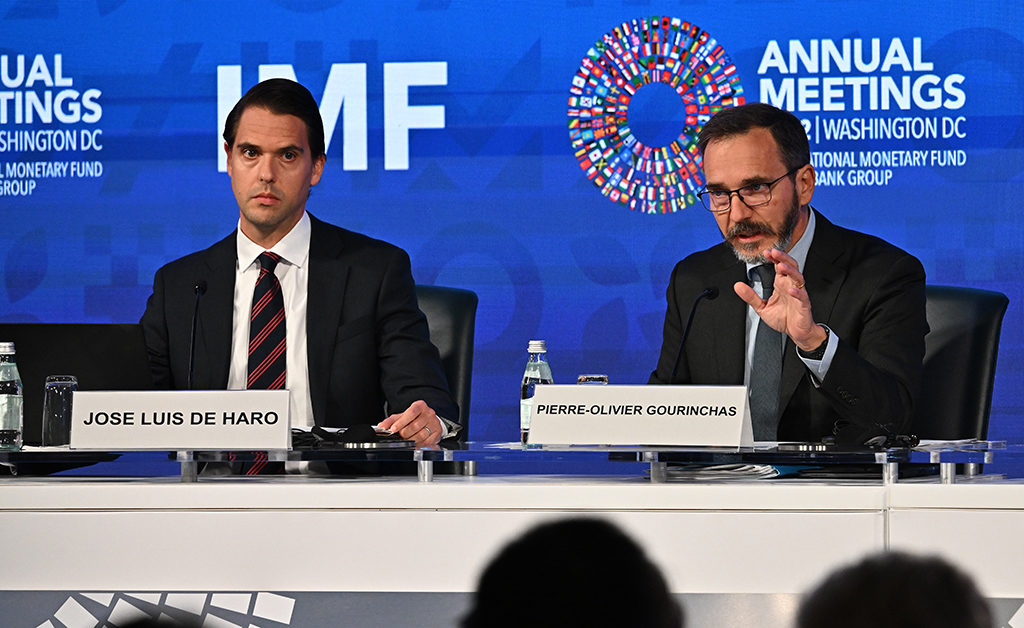WASHINGTON: Germany and Italy will slip into recession next year, becoming the first advanced economies to contract in the wake of Russia's invasion of Ukraine, an IMF forecast showed on Tuesday. While the eurozone will avoid a recession, the output of the 19-nation single currency area will slow sharply, eking out 0.5 percent growth-worse than previously forecast by the IMF.
The war on Europe's eastern flank has sent inflation soaring higher as energy prices have jumped, forcing the European Central Bank to hike interest rates to cool the economy, at the risk of precipitating a contraction. Germany-Europe's biggest economy-has paid dearly for its heavy reliance on gas from Russia, which cut supplies to Europe in suspected retaliation for Western sanctions over the conflict.
The German economy is now expected to shrink by 0.3 percent in 2023, the IMF said in an update to its World Economic Outlook from July, which had forecast 0.8 percent growth for the country. Italy, whose industries are also dependent on gas imports, will see its gross domestic product contract by 0.2 percent-also a sharp downgrade from 0.9 percent growth July. Germany and Italy are the only advanced economies seen going into recession next year in the revised outlook of the International Monetary Fund.
"Weak 2023 growth across Europe reflects spillover effects from the war in Ukraine, with especially sharp downward revisions for economies most exposed to the Russian gas supply cuts," the IMF said. The report also cited the "tighter financial conditions, with the European Central Bank having ended net asset purchases and rapidly raising policy rates by 50 basis points in July 2022 and 75 basis points in September 2022."
'Energy shock'
Prior to the war, economies were rebounding from the COVID pandemic and central bankers believed the rise in inflation would only be temporary. But the situation has deteriorated since Russia sent troops into neighboring Ukraine on February 24.
The world economy is now expected to grow by 2.7 percent next year, 0.2-percentage-points lower than in the IMF's July forecast. Russia's outlook, however, has improved, with the IMF seeing its sanctions-hit economy shrink by 2.3 percent next year, compared to 3.5 percent previously.
Across Europe, Russia's gas cuts and soaring utility prices have prompted countries to launch energy-saving measures-from advising people to lower their thermostats during winter to Paris turning off lights of monuments earlier-while governments scramble to find new sources of supplies.
"The energy shock in Europe is a really big deal," said Brian Coulton, chief economist at Fitch ratings agency. "In many ways, the energy shock is bigger in the EU than the oil shock was in the US in 1973," he said. The IMF's report warns that the situation could worsen.
"Particularly cold temperatures or insufficient gas demand compression this fall could force energy rationing during the winter in Germany," the report said. This could have "drastic effects for industry, weighing heavily on the euro area growth outlook and with potential for negative cross-border spillover effects."
The International Monetary Fund also cut its growth forecasts for China for this year and 2023 as strict COVID curbs and a crisis in the property sector fuel a slowdown in the world's number two economy.
China's gross domestic product is expected to expand 3.2 percent this year, the IMF said in its quarterly global forecast, down 0.1 percentage point from its previous forecast in July. That would be the country's weakest growth in around four decades, excluding the first year of the pandemic, according to data from the government and the World Bank.
The IMF said growth would pick up to 4.4 percent next year, though that would still be a 0.2 percentage point drop on its previous estimate. Both figures are well below Beijing's stated GDP growth target for this year of around 5.5 percent, a figure many analysts believe is now unattainable.
China last year recorded healthy expansion of 8.1 percent, albeit from a lower base owing to the impact of virus lockdowns in 2020. But the world's most populous nation has stuck fast to a policy of extinguishing new outbreaks as they emerge, unlike many countries which have moved to reopen as the public health threat from the virus has receded. Characterized by snap lockdowns, mass testing and lengthy quarantines, the zero-COVID strategy has "taken a toll on the economy, especially in the second quarter of 2022", the IMF said in its World Economic Outlook report.
A creeping crisis in the "rapidly weakening" real estate market-which accounts for about a quarter of annual GDP-"will weigh heavily on global trade and activity", added the Washington-based institution. "A worsening of China's property sector crisis could spill over to the domestic banking sector and weigh heavily on the country's growth" with potentially global consequences, it warned.
The slowdown in China comes as the global economy is battered by surging interest rates aimed at fighting soaring prices that have been triggered by Russia's war in Ukraine as well as global supply chain snarls. Beijing has sought to mitigate low growth in recent months with a series of easing measures to provide support, slashing key interest rates and pumping cash into the banking system. But observers say the effects do little to mitigate the impact of the strict lockdowns.
China is due to release its third-quarter growth figures and a number of other economic indicators this month. Growth slumped to just 0.4 percent in the three months through June, the country's worst performance since the early days of the pandemic. - AFP









